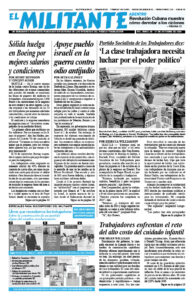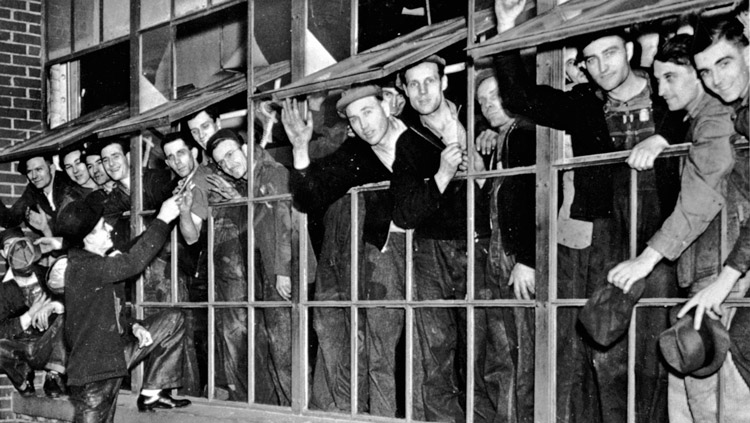The Transitional Program for Socialist Revolution by Leon Trotsky is one of Pathfinder’s Books of the Month for October. The excerpt below is from “The death agony of capitalism and the tasks of the Fourth International,” the program adopted in 1938 on the eve of World War II by the Socialist Workers Party and the international communist movement. It generalizes from decades of class-struggle experiences, especially that of the October Revolution in Russia led by the Bolsheviks. It is based on the revolutionary strategy developed in the Communist International under the leadership of V.I. Lenin. The program put forward by the SWP presidential campaign in 2024 is based on it. Copyright © 1977 by Pathfinder Press. Reprinted by permission.
Under the conditions of disintegrating capitalism, the masses continue to live the impoverished life of the oppressed, threatened now more than at any other time with the danger of being cast into the pit of pauperism. They must defend their mouthful of bread, if they cannot increase or better it.
There is neither the need nor the opportunity to enumerate here those separate, partial demands which time and again arise on the basis of concrete circumstances — national, local, trade union. But two basic economic afflictions, in which is summarized the increasing absurdity of the capitalist system — that is, unemployment and high prices — demand generalized slogans and methods of struggle.
The Fourth International declares uncompromising war on the politics of the capitalists, which to a considerable degree, like the politics of their agents, the reformists, aims to place the whole burden of militarism, the crises, the disorganization of the monetary system, and all other scourges stemming from capitalism’s death agony upon the backs of the toilers. The Fourth International demands employment and decent living conditions for all.
Neither monetary inflation nor stabilization can serve as slogans for the proletariat, because these are but two ends of the same stick. Against a bounding rise in prices, which with the approach of war will assume an ever more unbridled character, one can fight only under the slogan of a sliding scale of wages. This means that collective agreements should assure an automatic rise in wages in relation to the increase in price of consumer goods.
Under the menace of its own disintegration, the proletariat cannot permit the transformation of an increasing section of the workers into chronically unemployed paupers, living off the crumbs of a disintegrating society. The right to employment is the only serious right left to the worker in a society based upon exploitation. This right today is being shorn from him at every step. Against unemployment, “structural” as well as “conjunctural,” the time is ripe to advance, along with the slogan of public works, the slogan of a sliding scale of working hours.
Trade unions and other mass organizations should bind the workers and the unemployed together in the solidarity of mutual responsibility. On this basis all the work on hand would then be divided among all existing workers in accordance with how the extent of the working week is defined. The average wage of every worker remains the same as it was under the old working week. Wages, with a strictly guaranteed minimum, would follow the movement of prices. It is impossible to accept any other program for the present catastrophic period.
Property owners and their lawyers will prove the “unrealizability” of these demands. Smaller, especially ruined capitalists in addition will refer to their account ledgers. The workers categorically denounce such conclusions and references. The question is not one of a “normal” collision between opposing material interests. The question is one of guarding the proletariat from decay, demoralization, and ruin. The question is one of life or death of the only creative and progressive class, and by that token of the future of mankind. …
The petty-bourgeois democrats — including Social Democrats, Stalinists, and Anarchists — yell louder about the struggle against fascism the more cravenly they capitulate to it in actuality. Only armed workers’ detachments, who feel the support of tens of millions of toilers behind them, can successfully prevail against the fascist bands. The struggle against fascism does not start in the liberal editorial office but in the factory — and ends in the street. Scabs and private gunmen in factory plants are the basic nuclei of the fascist army.
Strike pickets are the basic nuclei of the proletarian army. This is our point of departure. In connection with every strike and street demonstration, it is imperative to propagate the necessity of creating workers’ groups for self-defense. … It is imperative wherever possible, beginning with the youth groups, to organize groups for self-defense, to drill and acquaint them with the use of arms.
A new upsurge of the mass movement should serve not only to increase the number of these units but also to unite them according to neighborhoods, cities, regions. It is necessary to give organized expression to the valid hatred of the workers toward scabs and bands of gangsters and fascists. It is necessary to advance the slogan of a workers’ militia as the one serious guarantee for the inviolability of workers’ organizations, meetings, and press. …
The strategic task of the next period — a prerevolutionary period of agitation, propaganda, and organization — consists in overcoming the contradiction between the maturity of the objective revolutionary conditions and the immaturity of the proletariat and its vanguard (the confusion and disappointment of the older generation, the inexperience of the younger generation).
It is necessary to help the masses in the process of the daily struggle to find the bridge between present demands and the socialist program of the revolution. This bridge should include a system of transitional demands, stemming from today’s conditions and from today’s consciousness of wide layers of the working class and unalterably leading to one final conclusion: the conquest of power by the proletariat.


